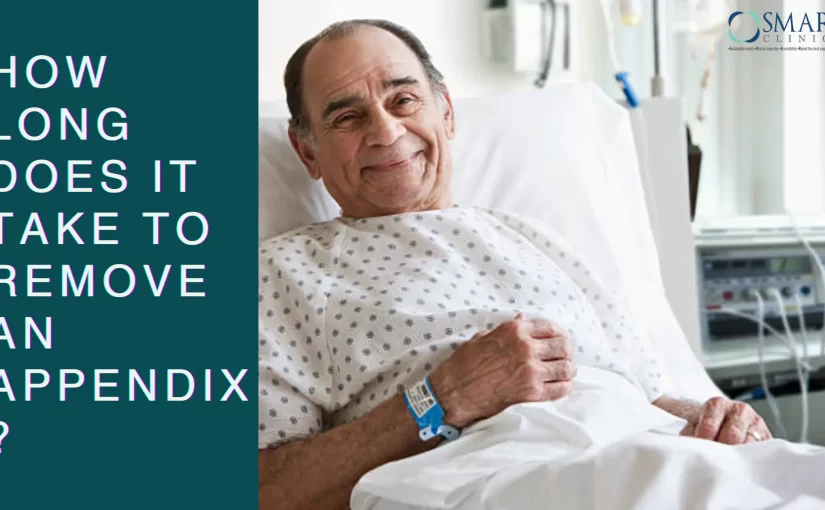How Long Does It Take to Remove an Appendix? Your Quick Guide to Appendectomy and Recovery
Acute Appendicitis is the most common abdominal emergency that can disrupt your life.
Appendix is a small organ located in the lower right abdomen that can become inflamed or infected. Appendicitis can lead to serious complications if not diagnosed and treated promptly, such as a ruptured appendix.
Appendectomy is the standard treatment that includes the removal of the infected appendix, itself. It is a routine surgery; however, many have questioned the length of time required to carry out the procedure as well as the recovery process thereafter.Here is everything you need to know about the process from the time it takes to its recovery timelines and any factor that may influence this surgery in the blog.
Appendectomy: A Quick but Crucial Surgery
Now that we already know about the diagnostic process, let’s find out more about appendectomy. The appendix removal is simple in nature. However, there are several factors that contribute to the duration involved and different methods of doing the procedure.
Laparoscopic vs. Open – What’s the Difference?
There are primarily two types of appendectomies in modern medicine: laparoscopic and open. The preferred method largely depends on the patient’s condition, but here’s a breakdown of each:
- Laparoscopic Appendectomy – It is a minimal invasive procedure that includes making small incisions and utilizing a camera. There’s a specific set of surgical instruments that are inserted through the incisions to remove the appendix. This method is preferred because there’s a reduced chance of infection, scarring and results in a faster recovery.
- Open Appendectomy – In some cases, especially when the appendix has ruptured or there are complications, a surgeon may need to make a larger incision to remove the appendix. Patients undergoing this procedure can expect an extended recovery period.
Typical Duration of the Surgery
On average, an appendectomy takes 20 to 30 minutes. This time frame may vary depending on the case and method used. A standard laparoscopic procedure would usually see surgeons remove the appendix relatively quickly.
But what happens when complications arise?
Factors That May Prolong the Surgery
If the appendix has ruptured, the surgical time might be prolonged because the abdominal cavity needs to be cleaned. Ruptured appendicitis is often a more complex care, which involves draining abscesses and managing the spread of infection, thus making the operation more complex. The procedure might also be slightly longer than usual if the patient is suffering from other health problems like obesity or weakened immune system.
Recovery: What to Expect After Your Appendectomy
After surgery, you may wonder how long it will take to fully recover. Although appendectomies are relatively low risk, each patient’s time to full recovery is a little different.
When Can You Return to Normal Activities?
Recovery for the patients who have undergone laparoscopic appendectomy is fast in nature. Most return to normal activities between 1 to 2 weeks. However, the time varies based on the method of the surgery, presence of any complications and the patient’s overall health.
How Long Does It Take to Fully Recover?
You will feel ‘back to normal’ perhaps after 1 to 2 weeks, but actual healing time is a bit longer: most take 4 to 6 weeks for healing. Be sure to observe your physician’s instructions so that such complications as infections or hernias are avoided.
What Factors Influence Surgery and Recovery Time?
Several factors can influence how long the surgery takes to complete and how quickly you would recover.
Your Overall Health and Age
Generally, fit, younger people tend to recover faster from surgery compared to others. If, for example, you have health conditions such as diabetes or heart disease or respiratory issues, for sure, it will be longer before you heal. As well, age is a factor, also; older adults may take longer to recuperate than younger patients.
Whether the Appendix Had Ruptured
A ruptured appendix complicates the surgery and recovery. If it ruptures, the bursting of the appendix spreads the bacteria throughout the abdomen. This increases the chances of infection. Thus, not only does it take longer for the surgery to be conducted, but it also results in more extended recovery times and additional treatments such as antibiotics.
The Experience of the Surgical Team
The time of the procedure also depends on the skill and experience of the surgical team. An experienced surgeon will likely complete the operation in a much more rapid manner, which can help reduce the surgery time and improve recovery results.
Conclusion: Seamless and Safe – The Appendectomy Process
In summary, an appendectomy is a usually safe and relatively short procedure in which most surgeries take between 20 to 30 minutes. Recovery time depends upon the type of surgery, whether your appendix has ruptured, and your general health. Most individuals can return to their daily routine within 1 to 2 weeks, but the full recovery may take around 4 to 6 weeks.
If you have appendicitis symptoms, seek medical attention as soon as possible. Prompt treatment will avoid complications and speed up recovery to normal life.
Remember, appendectomy is the only definitive treatment for appendicitis. If you or someone you know is experiencing appendicitis symptoms, don’t hesitate to contact a healthcare professional.
References
- https://www.mayoclinic.org/diseases-conditions/appendicitis/symptoms-causes/syc-20350494
- https://www.webmd.com/digestive-disorders/digestive-diseases-appendicitis
- https://www.healthline.com/health/appendectomy#What-is-an-appendectomy
- https://johnshopkinshealthcare.staywellsolutionsonline.com/Library/DiseasesConditions/Pediatric/CommonInjuries/92,P07686
- https://www.niddk.nih.gov/health-information/digestive-diseases/appendicitis







